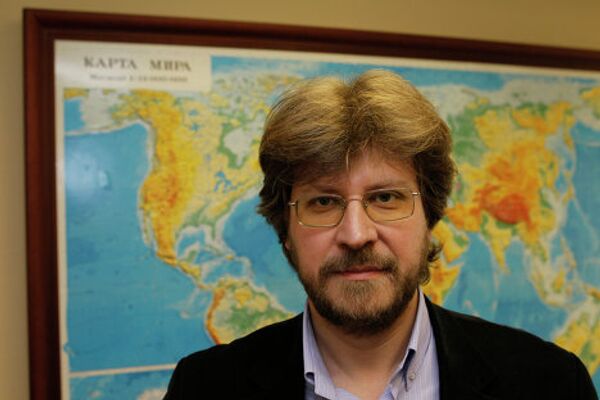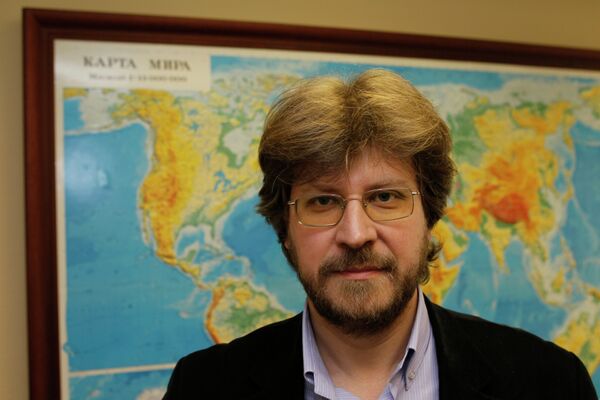Russia will step into 2014 with stunning foreign policy achievements. It is impossible to deny the increase in its international influence over the past year. Russia’s leaders and the Foreign Ministry deserve praise for their diplomatic skill and ability to achieve their goals. It is enough to recall Syria, Iran, the Customs Union and Ukraine. It is no accident that Forbes named President Vladimir Putin the most powerful person of the year, while Foreign Minister Sergei Lavrov was honored with thoughtful articles in leading Western periodicals that called him one of the most outstanding diplomats in the world.
Paradoxically, all of these successes are growing increasingly distinct from public perception of Russia abroad and the attitude toward Russian foreign policy at home.

As for international attitudes, while recognizing the intricacy of Russia’s foreign policy, the opinions of both Western and Eastern observers have not changed much. They still see Russia as a decaying country.
Many analysts believe that Moscow’s role in the world will diminish because the structure of Russia’s economy is heavily dependent on the international environment and because of demographic trends that can be adjusted but not reversed. Recent diplomatic successes are mainly viewed as a final revival before an inevitable decline.
Analysts don’t think much of Russia’s ability to drastically change its international priorities by renouncing the primacy of prestige and status in favor of practical development objectives. However, when ambition is not backed by real potential, the bubble is bound to burst. The West talks openly in these terms. Proceeding from the same premise, the East is pleased to exploit Russia’s activity for its own purposes.
As for domestic attitudes, they are peculiar. Naturally, diplomatic successes are popular. The majority of Russians are pleased about their country being a key player on the world scene. However, pure diplomacy as a self-sufficient skill fails to understand specific interests. In fairness, it should be mentioned that Russia’s national interests have not been defined by anyone except professional bureaucrats. Russian society as a whole is used to believing that foreign policy and big-time strategy is up to the government, that those at the top know better.
This idea has grown even stronger under Putin because his international course relies on a fairly broad consensus. The majority of Russians accept his efforts to restore Russia’s place in the world, so much so that even despite his occasional tough rhetoric, Putin always acts with caution and responds to the actions of others without going too far.
Today’s society is awakening and gradually beginning to identify itself as an active force. This is a slow process because foreign policy issues are not a top priority for the average person. That said, as people become more active they will start to have more influence on foreign policy. Public views on what Russian diplomats can and should do are diverse.
Who are the beneficiaries of Russia’s foreign policy and to what extent do they benefit? This question will come up sooner or later. To what degree does foreign policy meet the interests of industrial groups, religious associations, ethnic communities and different classes and social strata? Far from coinciding, the interests and foreign policy goals of these groups quite often contradict each other. Regardless of the definition, the active middle class and retired people, for example, have varying views on Russia’s place in the world. The position of Muslims on the Arab Spring may have little in common with the official line. Different sectors of Russia’s economy are guided by different international priorities. Russia is a diverse country, and people’s views on various issues may be worlds apart.
The victory in the recent battle for Kiev is indicative. Russia has outmaneuvered the European Union, having frustrated the Western bloc’s efforts and reduced its Eastern Partnership initiative to almost nothing. However, the investment of $15 billion from the National Wealth Fund into bonds of a pre-default country not only contradicts the rules of dealing with securities but also raises doubts about objectivity. Leaving aside abstract global rankings and focusing on the specific needs of various classes and groups, we must ask: In whose interests was this done?
The gap between foreign policy and national interests has yet to produce much effect, but it is these foreign policy successes that are making it obvious. Pleasing to the eye, they seem to hang in the air rather than be rooted in the ground. Neither society nor even intellectual circles have so far discussed at large Russia’s place in the world over the next few decades, or the country’s goals and means for development. Without this, the perception of Russia will only grow worse, both at home and abroad.
The views expressed in this article are the author’s and may not necessarily represent those of RIA Novosti.
Is Russia unpredictable? Perhaps, but one shouldn’t exaggerate – its randomness often follows a consistent pattern. But is the world at large predictable? The past two decades have seen all forecasts refuted more than once and have taught us only one thing – to be ready for any change. This column is on what the nations and governments are facing in the era of global uncertainty.
*Fyodor Lukyanov is Editor-in-Chief of the Russia in Global Affairs journal – the most authoritative source of expertise on Russian foreign policy and global developments. He is also a frequent commentator on international affairs and contributes to various media in the United States, Europe and China, including academic journals Social Research, Europe-Asia Studies, Columbia Journal of International Affairs. Mr. Lukyanov is a senior member of the Council on Foreign and Defense Policy and a member of the Presidential Council on Human Rights and Civic Society Institutions. He holds a degree from Moscow State University.
Uncertain World: Putin Embraces Conservatism as His Ideology
Uncertain World: Russia’s Successes, A Likely Trap?
Uncertain World: Russia: Shifting the Focus from Europe to Asia
Uncertain World: Ukraine’s Final Declaration of Independence
Uncertain World: Russia and the Ghost of Solitude
Uncertain World: The US Internal Crisis and its Global Significance
Uncertain World: Grand Diplomacy Is Back
Uncertain World: Why Hasn’t Obama Renewed US Foreign Policy?
Uncertain World: Russia and Ukraine on the Verge of a Decisive Choice
Uncertain World: 5 Years After the 5-Day War, Everyone’s Learned Their Lessons

